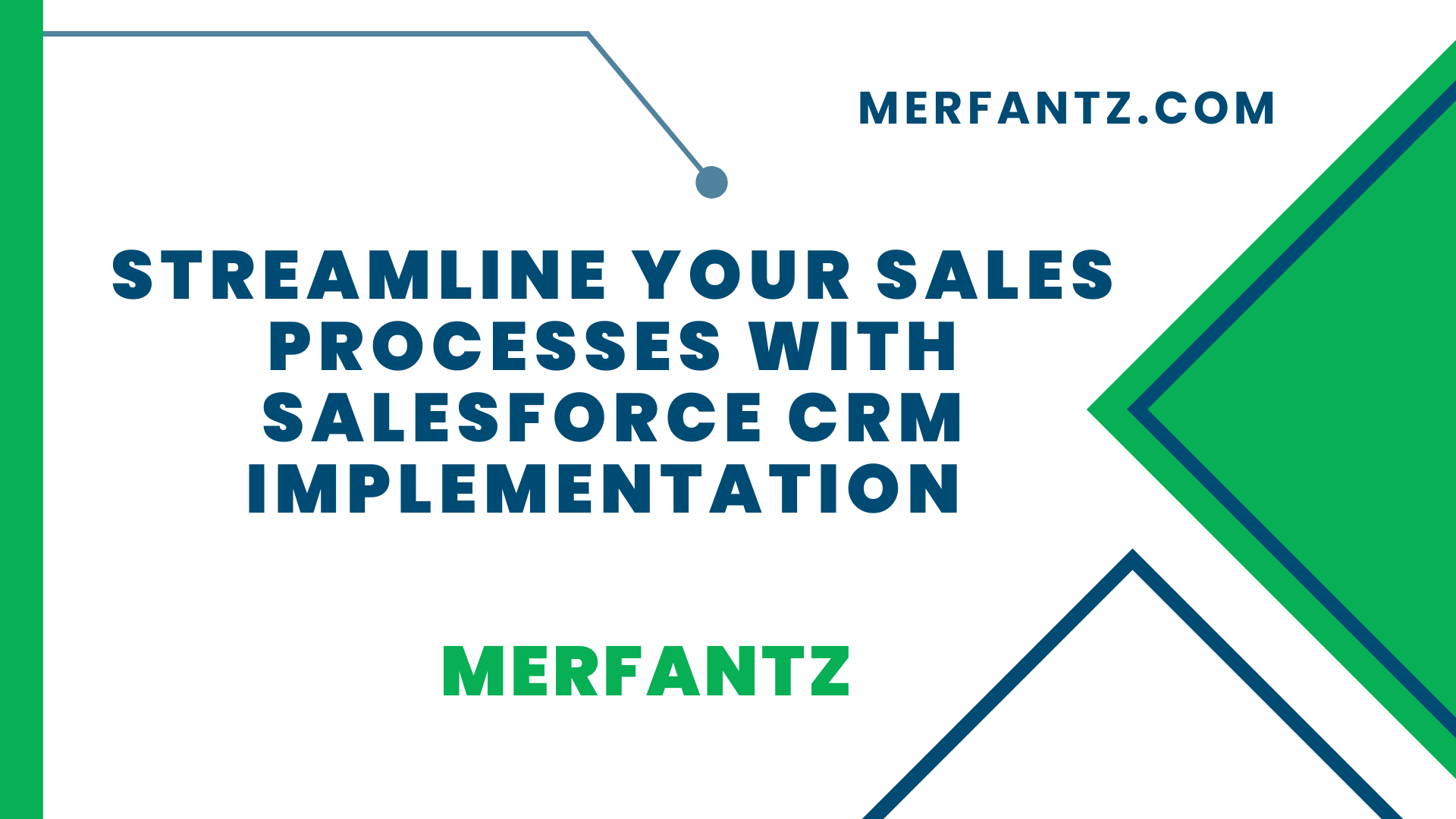Why Salesforce CRM is Crucial for Your Sales Success
Salesforce CRM has emerged as a game-changer in the world of sales and customer relationship management. It offers a comprehensive suite of tools and functionalities that can streamline your sales processes, enhance productivity, and drive success. With Salesforce CRM, you gain a centralized platform to manage and track customer interactions, leads, opportunities, and deals, providing your sales team with valuable insights and empowering them to make data-driven decisions. By leveraging the power of Salesforce CRM, you can optimize your sales pipeline, improve customer satisfaction, and ultimately boost your revenue.
One of the key reasons why Salesforce CRM is crucial for your sales success is its ability to foster collaboration and enhance communication within your sales team. With features like real-time updates, task management, and shared calendars, Salesforce CRM enables your team members to work seamlessly together, ensuring that everyone is on the same page and driving towards common sales goals. Additionally, Salesforce CRM provides robust reporting and analytics capabilities, allowing you to gain valuable insights into your sales performance, identify areas for improvement, and make informed strategic decisions. By harnessing the power of Salesforce CRM, you can unlock the full potential of your sales team and achieve remarkable growth.
The Key Features of Salesforce CRM for Streamlined Sales Processes
Salesforce CRM offers a wide range of features that are specifically designed to streamline and optimize your sales processes. One of the key features is the lead management functionality, which allows you to efficiently capture, qualify, and distribute leads among your sales team. With lead scoring and automated lead assignment, Salesforce CRM ensures that your sales reps focus on the most promising opportunities, maximizing their productivity and closing rates. Additionally, Salesforce CRM provides a comprehensive contact and account management system, enabling you to keep track of all customer interactions, communication history, and key details, ensuring personalized and effective sales engagements.
Another crucial feature of Salesforce CRM is the opportunity management functionality. This feature allows you to effectively track and manage your sales opportunities throughout the entire sales cycle. You can easily update opportunity stages, assign tasks, collaborate with team members, and monitor progress, ensuring that no opportunity falls through the cracks. Salesforce CRM also offers powerful forecasting capabilities, allowing you to accurately predict and plan for future sales. By leveraging these features, you can streamline your sales processes, improve efficiency, and drive consistent results.
How Salesforce CRM Improves Lead Management and Conversion Rates
Effective lead management is essential for driving higher conversion rates and maximizing your sales success. Salesforce CRM offers robust tools and functionalities that can significantly enhance your lead management processes. With Salesforce CRM, you can capture leads from various sources, such as web forms, emails, and social media, and automatically assign them to the right sales representatives based on predefined rules. This ensures that leads are promptly followed up, increasing the chances of conversion. Salesforce CRM also enables lead nurturing through personalized communications and targeted marketing campaigns, allowing you to build relationships and guide leads through the sales funnel.
In addition to lead capture and nurturing, Salesforce CRM provides comprehensive lead tracking and analytics capabilities. You can monitor lead activity, track engagement levels, and gain valuable insights into lead quality and conversion rates. This data-driven approach enables you to identify your most successful lead sources and campaigns, make data-backed decisions to optimize your lead generation efforts, and focus on strategies that yield the highest return on investment. By leveraging Salesforce CRM for lead management, you can streamline your processes, improve lead quality, and ultimately increase your conversion rates.
Implementing Salesforce CRM: A Step-by-Step Guide
Implementing Salesforce CRM requires careful planning and execution to ensure a successful deployment. Here is a step-by-step guide to help you navigate through the implementation process. First, assess your business needs and define your sales processes. Understand your unique requirements, such as lead management, opportunity tracking, and reporting, and map them to Salesforce CRM functionalities. This will serve as the foundation for your implementation plan.
Next, configure and customize Salesforce CRM to align with your specific business needs. Set up user profiles, security settings, and data access controls to ensure the right level of permissions and data integrity. Customize fields, layouts, and workflows to match your sales processes and terminology. Leverage Salesforce CRM’s extensive range of pre-built apps and integrations to enhance functionality and streamline data flow between systems. Finally, provide comprehensive training and support to your sales team to ensure smooth adoption and maximize the benefits of Salesforce CRM. Regularly evaluate and fine-tune your implementation to optimize performance and address evolving business requirements.
Customizing Salesforce CRM to Fit Your Unique Sales Requirements
One of the greatest strengths of Salesforce CRM is its ability to be customized to fit your unique sales requirements. By tailoring Salesforce CRM to match your specific business processes, terminology, and data structures, you can optimize productivity, enhance user adoption, and achieve better sales outcomes. Salesforce CRM offers a wide range of customization options, including creating custom fields and objects, designing custom layouts and page templates, and configuring automation rules and workflows.
To customize Salesforce CRM effectively, start by thoroughly understanding your sales processes and identifying areas that can be streamlined or improved. Collaborate with your sales team to gather their input and insights, as they are the end users who will benefit from the customization. Map your sales processes to Salesforce CRM functionalities and determine the customization requirements. Work closely with Salesforce administrators or consultants to implement the customizations, ensuring that they align with best practices and maintain data integrity. Regularly review and refine your customizations to adapt to changing business needs and maximize the value of Salesforce CRM.
Integrating Salesforce CRM with Existing Sales Tools and Systems
Integrating Salesforce CRM with your existing sales tools and systems can unlock powerful synergies, streamline data flow, and enhance your overall sales effectiveness. Salesforce CRM offers a robust set of integration capabilities, enabling seamless connectivity with a wide range of third-party applications and systems. Whether you need to integrate with your email marketing platform, customer support system, or e-commerce platform, Salesforce CRM provides flexible and scalable integration options.
To ensure a successful integration, start by evaluating your existing sales tools and systems and identifying the key data and processes that need to be integrated with Salesforce CRM. Determine the integration points and data flow requirements. Leverage Salesforce CRM’s pre-built integrations or use its extensive set of APIs and development tools to build custom integrations. Work closely with your IT team or engage with Salesforce integration experts to design, develop, and test the integrations. Regularly monitor and maintain the integrations to ensure data consistency and accuracy across systems. By integrating Salesforce CRM with your existing sales tools and systems, you can create a unified and efficient sales ecosystem.
Measuring Success: Tracking Sales Performance with Salesforce CRM
Measuring and tracking sales performance is essential for driving continuous improvement and achieving sales success. Salesforce CRM provides robust reporting and analytics capabilities that enable you to monitor and measure various key performance indicators (KPIs). You can generate real-time reports and dashboards to gain insights into sales activities, pipeline health, revenue forecasts, and individual performance metrics. This visibility empowers you to identify trends, spot areas for improvement, and make data-driven decisions to optimize your sales processes.
In addition to standard reports, Salesforce CRM allows you to create custom reports and dashboards tailored to your specific business needs. You can set up automated reports to receive regular updates on sales metrics and share them with relevant stakeholders. By leveraging Salesforce CRM’s powerful reporting and analytics capabilities, you can gain a deep understanding of your sales performance, identify bottlenecks or inefficiencies, and take proactive measures to drive improvements. Regularly analyze your sales data, track key metrics, and compare performance against targets to assess the effectiveness of your sales processes and strategies. With Salesforce CRM, you have the tools to measure success, make informed decisions, and continuously optimize your sales performance.
Overcoming Challenges in Salesforce CRM Implementation
Implementing Salesforce CRM can bring significant benefits to your sales processes, but it is not without its challenges. One common challenge is data migration. Migrating existing data from legacy systems or spreadsheets into Salesforce CRM requires careful planning, cleansing, and mapping to ensure data accuracy and integrity. Another challenge is user adoption. Introducing a new system to your sales team may face resistance or reluctance to change. To overcome this, provide comprehensive training, clearly communicate the benefits of Salesforce CRM, and involve your sales team in the implementation process to build buy-in and ownership.
Integration with existing systems and processes can also present challenges. Ensuring seamless data flow and integration points between Salesforce CRM and other tools or systems may require technical expertise or third-party integration services. Additionally, customizing Salesforce CRM to fit your unique sales requirements may require advanced configuration and development skills. It’s important to work with experienced Salesforce consultants or partners who can navigate these challenges and provide guidance throughout the implementation process. By proactively addressing challenges, you can ensure a smooth Salesforce CRM implementation and maximize its benefits for your sales processes.
Training and Onboarding: Ensuring Smooth Adoption of Salesforce CRM
Training and onboarding are critical components of a successful Salesforce CRM implementation. To ensure smooth adoption by your sales team, it’s important to provide comprehensive training and support. Start by creating a training plan that covers the key functionalities of Salesforce CRM, tailored to the roles and responsibilities of your sales team members. Conduct interactive training sessions that combine theoretical knowledge with practical hands-on exercises to familiarize users with the system. Provide training resources, such as user manuals, video tutorials, and FAQs, that can serve as references for ongoing learning and support.
In addition to initial training, ongoing support and reinforcement are essential for continuous user adoption. Establish a feedback mechanism where users can ask questions, seek assistance, and provide suggestions for improvement. Encourage a culture of knowledge sharing and peer learning, where experienced users can mentor and support new users. Regularly communicate the benefits and successes of Salesforce CRM to your sales team, highlighting how it enhances their productivity, efficiency, and sales performance. By prioritizing training and onboarding, you can ensure that your sales team fully embraces Salesforce CRM and leverages its capabilities to drive success.
Choosing the Right Partner for Salesforce CRM Implementation
Choosing the right partner for your Salesforce CRM implementation is crucial for a successful deployment. An experienced and reputable Salesforce consulting partner, such as Merfantz Technologies, can provide the expertise and guidance needed to tailor Salesforce CRM to your unique sales requirements. Look for a partner with a track record of successful implementations and a deep understanding of sales processes. They should have certified Salesforce consultants who can assess your needs, design a customized solution, and provide ongoing support.
Consider the partner’s industry experience and knowledge of your specific business domain. They should be able to offer best practices and insights relevant to your industry. Evaluate their ability to provide comprehensive services, including data migration, system integration, customization, training, and ongoing support. Request client references and testimonials to gain confidence in their capabilities. A strong partnership with the right Salesforce implementation partner will ensure a smooth implementation, optimize your sales processes, and drive success with Salesforce CRM.
FAQ
What is Salesforce CRM?
Salesforce CRM, or Customer Relationship Management, is a powerful software platform that helps businesses manage and streamline their sales, marketing, and customer service activities. It provides a centralized system to track customer interactions, manage leads and opportunities, automate sales processes, and generate detailed reports and analytics. Salesforce CRM is highly customizable and scalable, making it suitable for businesses of all sizes and industries.
How long does it take to implement Salesforce CRM?
The timeline for Salesforce CRM implementation can vary depending on factors such as the complexity of your sales processes, the size of your organization, and the level of customization required. Generally, a typical implementation can range from a few weeks to several months. It involves stages such as planning, configuration, data migration, integration, testing, and user training. It is important to work with an experienced implementation partner who can guide you through the process and provide an accurate timeline based on your specific requirements.
Can Salesforce CRM be integrated with other software systems?
Yes, Salesforce CRM offers robust integration capabilities, allowing seamless connectivity with a wide range of third-party software systems. Whether you need to integrate with your email marketing platform, customer support system, ERP software, or other business tools, Salesforce CRM provides flexible integration options. It offers pre-built integrations, connectors, and APIs that enable data exchange and synchronization between systems. Integrating Salesforce CRM with your existing software ecosystem can help centralize data, eliminate manual data entry, and streamline processes across different departments.
Is training provided for users after Salesforce CRM implementation?
Yes, training is an essential part of Salesforce CRM implementation. After the system is configured and ready for use, it is important to provide comprehensive training to your sales team and other users. Training sessions can include both theoretical and hands-on practical exercises to familiarize users with the functionality and features of Salesforce CRM. Training resources such as user manuals, video tutorials, and FAQs should also be made available for ongoing learning and support. The goal is to ensure that users have a solid understanding of Salesforce CRM and can utilize its capabilities effectively to drive sales success.
How can CRM help you streamline your operations?
CRM (Customer Relationship Management) software can streamline operations by providing a centralized system to manage customer interactions, automate processes, and optimize workflows. It enables efficient lead management, improved communication, and better collaboration among team members, leading to streamlined operations and increased productivity.
How do you streamline sales processes?
Sales processes can be streamlined by implementing effective strategies such as automation, standardization, and optimization. This involves defining clear sales stages, automating repetitive tasks, leveraging technology tools like CRM software, providing comprehensive sales training, and regularly analyzing and refining processes to eliminate bottlenecks and improve efficiency.
What is the sales process in Salesforce CRM?
The sales process in Salesforce CRM refers to the systematic series of steps followed to convert a lead into a closed deal. It typically includes stages such as lead generation, lead qualification, opportunity creation, prospect engagement, negotiation, and closing. Salesforce CRM provides tools to track and manage these stages, ensuring a structured and efficient sales process.
What is CRM? How is CRM implemented by Salesforce?
CRM stands for Customer Relationship Management, which is a software system designed to manage customer interactions, track leads, opportunities, and customer data, and improve overall customer relationships. Salesforce is a leading CRM provider that offers a cloud-based platform for CRM implementation. Salesforce CRM is implemented by configuring the software to match specific business needs, customizing fields and workflows, integrating with other systems, migrating data, and providing user training and support.
Conclusion
Salesforce CRM implementation can revolutionize your sales processes, improve efficiency, and drive success. By leveraging its robust features, customizing it to fit your unique requirements, integrating it with existing tools and systems, and measuring performance, you can streamline your sales operations and achieve remarkable growth. Overcoming implementation challenges, providing comprehensive training and support, and choosing the right implementation partner are crucial steps to ensure a successful deployment. At Merfantz Technologies, we have the expertise and experience to guide you through the Salesforce CRM implementation journey and empower your sales team for success. Contact us today to discover how Salesforce CRM can transform your sales processes and drive exceptional results.
Author Bio
Co-Founder & CMO at Merfantz Technologies Pvt Ltd | Marketing Manager for FieldAx Field Service Software | Salesforce All-Star Ranger and Community Contributor | Salesforce Content Creation for Knowledge Sharing






